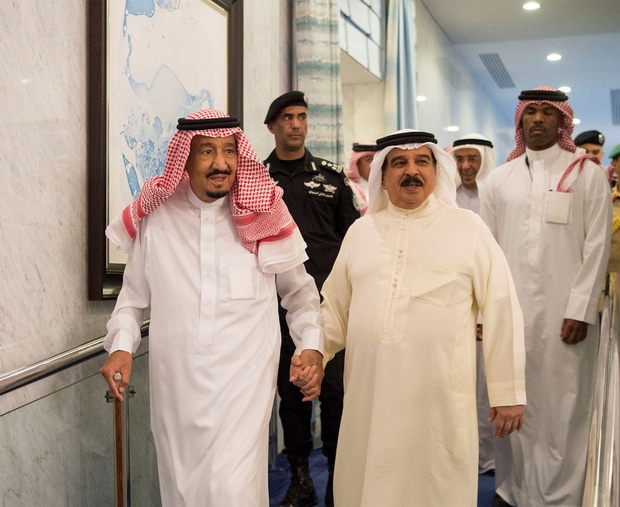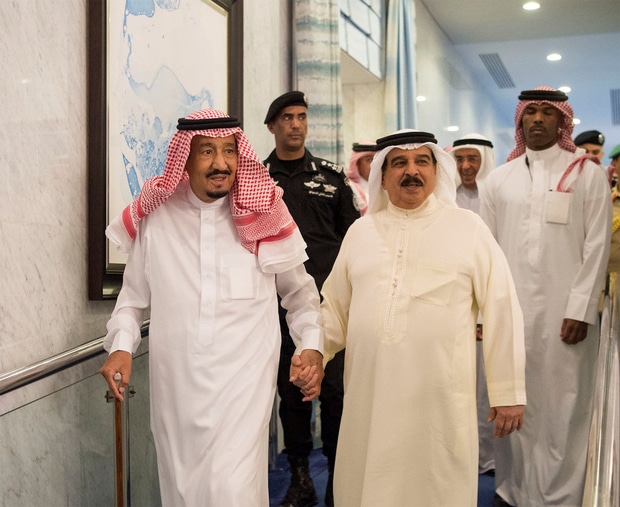What in the name of Allah is going on with the spat between Qatar, on one side, and the Saudis, the United Arab Emirates, and most of the rest of the Arab states on the other? Accusations that Qatar is the fulcrum of “terrorism” in the region, emanating from Riyadh and Abu Dhabi – the twin epicenters of Islamic extremism on earth – seemed to have been broadcast from Bizarro World. And the incident that sparked the controversy — in which much of the Arab world, led by the Saudis, blockaded tiny Qatar — added the extra-hot spice of cyber-espionage to an already indigestible dish.
Shortly after President Donald Trump’s visit to Saudi Arabia, where he announced his “anti-terrorist” initiative, the web site of the Qatar News Agency, run by the Qatari government, was hacked. A “fake news” story was posted by the hackers, purporting to describe a speech given by the current Emir, Sheikh Tamim Bin Hamad al-Thani, in which he called for better relations with Iran, praised Hamas and Hezbollah, and predicted that Trump’s term in the White House would be short.
Despite the Qataris’ claim – since verified by the FBI, according to Qatar’s foreign minister – that the Qatar News Agency site had been hacked, and that the Emir had given no such speech, both the Saudis and the UAE, through their official media outlets, launched a campaign targeting Qatar. Overflight rights were revoked: diplomatic contacts ended: Qatar citizens were forbidden to enter Saudi/UAE territory even to change planes. And in a public statementdelivered in the rose garden of the White House President Trump clearly sided with the Saudi/UAE consortium, complementing a series of remarkably stupid tweets that basically said the same thing.
The US news media managed to get a Russian angle on all this, claiming that “Russian hackers” were behind the targeting of the Qatar News Agency: as usual they offered no evidence for this assertion. Yet just who was behind this hacking incident seems crucial to understanding the real genesis of – and motive behind – the Qatar controversy, which could augur a new regional crisis possibly dragging in Iran.
So let’s look at the timeline in the context of yet another hacking incident, this one involving the hotmail account of Yousef Al-Otaiba, the UAE’s well-connected ambassador to the US. The hackers, who call themselves “GlobalLeaks,” released a tranche of emails between Al-Taiba and individuals connected to the Foundation for the Defense of Democracies (FDD). The Foundation is a pro-Israel thinktank originally called “Emet: An Educational Initiative, Inc.,” founded in 2001 by a group of pro-Israel billionaires and designed to blunt growing American sympathy for the Palestinians. FDD has since expanded its mission, under chief honcho Clifford May, to encompass a full-scale projection of Israeli propaganda in the US. The Otaiba-FDD emails reveal extensive cooperation between the ostensibly ultra-Islamic UAE – which, like its Saudi allies and much of the Arab world, has never recognized the state of Israel — and the staunchly Zionist FDD. (See some of the emailshere, here, here, and here.) A great deal of the back and forth is between FDD general counsel and former Bush era National Security Advisor John Hannah and Mr. Al-Otaiba.
The emails detail FDD’s efforts to show Al-Otaiba that UAE companies doing business with Iran need to be sanctioned: a “target list” is included. The correspondence also details plans for a June 11-14 meeting with FDD personnel and UAE political and military officials, including the ambassador, FDD CEO Mark Dubowitz, and former US defense secretary Robert Gates. And most significantly, on the agenda was “discussion of possible U.S./UAE policies to positively impact Iranian internal situation” including “political, economic, military, intelligence, and cyber tools” designed to “contain and defeat Iranian aggression.”
Hmmmm… “cyber tools,” eh?
Now add to the timeline this reporting by the New York Times:
[T]hree days after the Trump meeting in Riyadh, the Foundation for the Defense of Democracies held a conference in Washington dedicated to criticism of Qatar, titled ‘Qatar and the Muslim Brotherhood’s Global Affiliates.’
Robert M. Gates, the former defense secretary and a friend of Mr. Otaiba, gave the keynote. Attendees included many of the authors of the critical op-ed articles and senior Obama administration officials. Organizers encouraged Mr. Otaiba to attend, and his staff sent Abu Dhabi, the Emirati capital, a detailed report.
No representative of Qatar was invited. The hack of the Qatari news agency took place after midnight that night.
What a coincidence!
As this piece in the Washington Post puts it, the speculation that “Russian hackers” under Russian state control are behind the Qatar hack is “unlikely.” Emails from the hackers bearing Russian “(.ru) addresses seem designed to put detectives off the trail. The Post piece avers that hackers-for-hire were the responsible parties, but the question is: who were they working for?
Which leads us to a larger question: who benefits? Clearly both the Saudis and the Israelis – whose semi-clandestine alliance has been documented in this space – had everything to gain from this intra-Arab spat. United by fear and hatred of Iran, Riyadh and Tel Aviv have been quietly cooperating to unite the Sunni Arabs against Iran – and draw the United States into open conflict with Tehran. Both abhorred and denounced the Iran deal, and are seeking to actively undermine it: that’s another item at the top of the FDD/UAE meet up.
Another factor is the relationship between Mr. Al-Taiba and Jared Kushner, Trump’s son-in-law and a powerful figure in the administration: the ambassador has been described as Kushner’s “mentor” when it comes to schooling him on all matters Middle Eastern. Kushner, for his part, is a strong advocate for Israel.
There are no innocents, no “good guys” in this part of the world: the reality is that all of these Middle Eastern actors have been subsidizing terrorist outfits, in Syria and elsewhere. The Saudis are perhaps the worst offenders: their worldwide network of radical Wahabist mosques and “educational” outfits has been pushing a terrorist agenda for decades. The UAE has also been a lucrative source of funding for radical Islamic terrorism, notably inAfghanistan and Pakistan. And while Qatar has not been stingy in this regard, its stance has been notably non-sectarian: while they’ve given support to the Muslim Brotherhood – perhaps the least radical Sunni organization – they are also capable of sending official congratulations to recently re-elected Iranian President Hassan Rouhani. This is their great “sin” in the eyes of the Saudi-led Sunni Axis: they have tried to mediate the Sunni-Shi’ite religious war, which threatens the entire region with the kind of bloody turmoil that occasioned Europe’s Thirty Years’ War between Catholics and Protestants.
The idea that Qatar is solely responsible for the growth and development of Middle Eastern terrorism is laughable on its face: that narrative simply won’t stand even the most careless scrutiny. And the proposition that Saudi Arabia is any kind of anti-terrorist bulwark is a cruel joke. That the Trump administration is taking this line is absolutely criminal: it amounts to appeasing and succoring the epicenter of radical Islamic terrorism.
The crazy notion that Iran is the world’s leading exporter of terrorism is a page right out of the Israeli-Saudi playbook: for the Trump administration to echo this nonsense contradicts the facts and contravenes American interests in the region. For it is the Saudis who have been funding and arming ISIS, and al-Qaeda, in Syria. And the Israelis have openly proclaimed their preference for ISIS over Syrian strongman Bashar al-Assad. It is radical Sunni fundamentalists, not pro-Iranian Shi’ites, who have been conducting a global jihad against American and European targets. Iran is fighting ISIS in Syria – while the US in bombing Syrian government troops, the main obstacle to the ISIS/al-Qaeda forces.
The Saudi-Qatari conflict has all the hallmarks of a joint Saudi-Israeli operation, complete with cyber-hacking, a full-scale propaganda war, and a clueless Uncle Sam stupidly falling for a brazen deception. What’s amazing is that, despite the plethora of evidence that the whole thing is a pretty transparent put up job, the usual suspects continue to get away with it.
Reprinted with permission from Antiwar.com.


